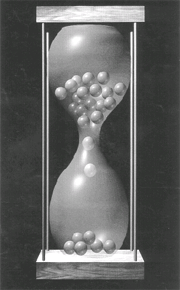If you have the inclination
If you have the inclination

in applications like satellite navigation, a fraction of a second here or there can send the satellite straying off its path. The best clocks in the world (including the international definition of the second) are based on a specific transition of electrons in caesium atoms. Now, a team of scientists from the Paris Observatory and the University of Western Australia has built what might be called the world's most accurate caesium clock. This clock is so stable that the only limitations to its performance are the laws of quantum mechanics.
The basic idea behind a caesium clock is to use microwaves to hit the atoms of caesium. The atoms are made to travel through a long tube and the microwave photons hit them twice







